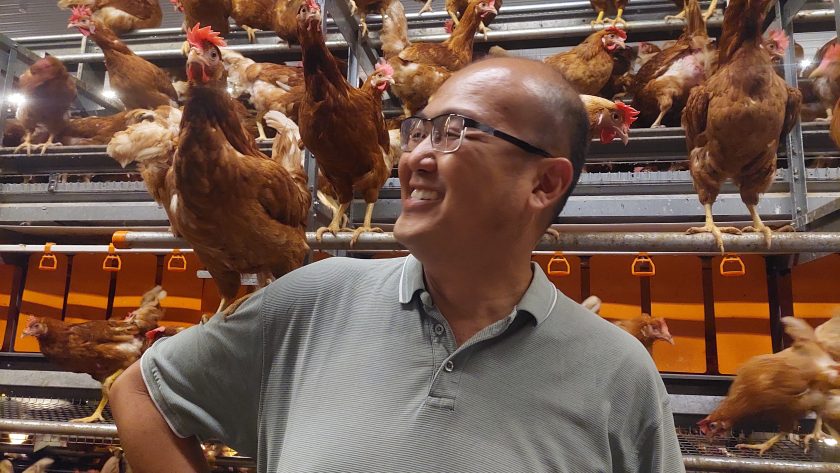Malaysia’s poultry industry is undergoing a quiet revolution with the rise of cage-free egg farming, and at the center of this shift is Teong Choon Poultry Farm (TC Farm), the country’s first large-scale producer of cage-free eggs.
Led by General Manager Tiew Siew Sien, TC Farm is building a model of ethical, sustainable egg production that reflects a growing global shift toward animal welfare, food transparency, and long-term food system resilience.
These layers are encouraged to behave naturally in this cool, temperature-controlled environment.
Pioneering the sector
The company’s partnership with German livestock equipment specialist Big Dutchman has been instrumental in implementing cutting-edge aviary systems that allow hens to express natural behaviors such as perching and dust bathing.
TC Farm’s cage-free facility is not only a milestone for Malaysia, but a signal to Southeast Asian producers that the cage-free transition is no longer niche—it is inevitable.
“We are slowly increasing our cage-free production,” Mr Tiew told aviNews Asia.
“The site you visited is still has limited production, but we are already in the market, supplying to small-scale retailers and the hotel sector.”
The eggs are collected manually outside once they pass through the conveyor.
Egg count
TC Farm currently produces around 30,000 cage-free eggs daily and expects to increase output to approximately 45,000 daily by year-end.
The total farm output, including conventional eggs, ranges from 130,000 to 140,000 eggs daily.
Expansion is carefully phased in line with the lifecycle of laying hens, ensuring that each flock completes its production cycle before scaling further.
The egg station where cage-free and conventional eggs are sorted, graded and packed.
The farm’s approach to feed is also tightly controlled. TC Farm manufactures its own vegetarian-based feed, avoiding fish oil in its Omega-3 enriched eggs.
“We use yeast-based ingredients for Omega enrichment,” Mr Tiew revealed. “That way we know exactly what goes into our feed, from A to Z.”
Challenges
However, the local market presents challenges. Despite offering premium cage-free eggs at around USD 3.35 per box of 10, consumer adoption remains slow. While some grocers and eco-conscious buyers are receptive, volume remains limited.
“Consumers are trying the eggs,” Mr Tiew said. “The market is moving slowly, but there is growth.”
In contrast, institutional buyers—particularly in the hospitality sector—have shown stronger interest. TC Farm supplies cage-free eggs to selected hotels, where bulk purchasing offsets the lower price point.
“Hotels consume more, and though the price is slightly lower, the volume helps,” Mr Tiew said.
Institutional implementations
The company is also in discussions with local major foodservice brands, restaurant and health mart chains, though implementation has been delayed.
“Some of the chains are in the midst of promoting other products like seaweed eggs, but they plan to switch to cage-free around 2028. They remain in our pipeline,” Mr Tiew said.
TC Farm also produces other designer eggs such as seaweed-fed chicken eggs.
TC Farm is also closely monitoring regional export opportunities as outbreaks of avian influenza have disrupted supply chains in Japan, South Korea, Taiwan, and parts of Europe.
While direct exports to the US remain costly due to freight charges, Mr Tiew acknowledged growing global demand.
“Even if eggs can’t reach the US, other countries facing shortages may present opportunities,” he said.
Domestic outlook
Meanwhile, the domestic market remains volatile. During the Eid holidays in April 2025, egg supply outpaced demand, prompting some producers to offload stock at lower prices.
“Local players are dumping eggs because their stalls are full. They have to clear stock,” said Mr Tiew. “This benefits consumers, but producers are suffering.”
Typically, the market recovers within 2-3 weeks after such events. However, this year has been especially challenging.
“Production has been cut, so we expect prices to normalize once the old stock clears,” he said.
Despite these fluctuations, TC Farm remains optimistic about long-term growth, especially as more institutions commit to humane sourcing standards.
Their certification by Humane Farm Animal Care places them at the forefront of ethical production in the region.
Offering better options
“We want to offer better options, not just for consumers but for the industry,” Mr Tiew said. “It’s not only about premium pricing—it’s about sustainable practices and future-ready farming.”
As Malaysia edges closer to food security reforms under the National Agrofood Policy 2.0, TC Farm’s cage-free model offers a glimpse into what the future of poultry farming could look like— humane, transparent, and resilient.
For investors watching the protein sector in Southeast Asia, TC Farm represents both a market pioneer and a bellwether for shifting consumer and regulatory expectations.

